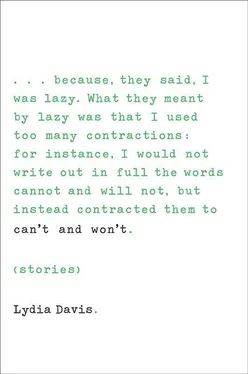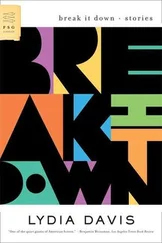She did not like to eat larger chocolates, she decided. Now that she had, for the first time, experienced the tiniest of chocolates, that was what she preferred.
She had, some months before, been offered a chocolate in Connecticut, in the home of a rather severe Belgian woman whom she had known for many years. It had been a good chocolate, as far as she could tell, but she had found it a little too large, too large to eat quickly, in any case. She had taken many small bites of it, and enjoyed those bites, but had not wanted another chocolate when urged. The other people present had found that strange, and the Belgian woman had laughed at her.
The Woman Next to Me on the Airplane
The woman next to me has many fast and easy crossword puzzles to do during the flight, from a book called Fast and Easy Crosswords. I have only slow and difficult crosswords, or impossible crosswords. She finishes each puzzle and turns the page, as we fly at top speed through the air. I stare at one page and don’t finish any.
Life is too serious for me to go on writing. Life used to be easier, and often pleasant, and then writing was pleasant, though it also seemed serious. Now life is not easy, it has gotten very serious, and by comparison, writing seems a little silly. Writing is often not about real things, and then, when it is about real things, it is often at the same time taking the place of some real things. Writing is too often about people who can’t manage. Now I have become one of those people. I am one of those people. What I should do, instead of writing about people who can’t manage, is just quit writing and learn to manage. And pay more attention to life itself. The only way I will get smarter is by not writing anymore. There are other things I should be doing instead.
Wrong Thank-You in Theater
At the back of the auditorium, as the theater fills for the event, I stand up from my seat to let a woman get past me to her seat in the row.
“Thanks,” she says.
“Mmm-hmm!” I say in acknowledgment.
But I have misunderstood. She was not thanking me, she was thanking the usher, who is standing a few feet behind me.
“No, I meant her ,” she says, without looking at me.
She just wanted to make that clear.
Today I paid a condolence call on Safwan, the owner of the Farm and Country Deli. His rooster was killed last week on the road. I had first stopped at the house across from the deli, where there are many chickens and three roosters — but it was not one of those that had been killed. I talked to Safwan for a little while. He said he would not be getting another rooster — the road was too dangerous. His rooster had often wandered into the road pecking at crumbs, Safwan said, instead of staying in the backyard, because of the dog in the yard next door, which frightened him.
After I had paid my condolence call, I picked up two of the rooster’s oily green feathers from the side of the road for a keepsake, and returned home. I sent my friend Rachel a message telling her that I was sad about Safwan’s rooster, whose regular cry all day long had made me happy. Each time I heard it, I felt I was really living out in the country — at least farther out in the country than I had been in my last place.
Rachel, who always has many lines of poetry in her head, sent me in return some lines from a poem by Elizabeth Bishop: “Oh, why should a hen /have been run over/on West 4th Street…?” I liked the lines, though I had trouble imagining a hen alive on West 4th Street, let alone a hen that had been run over. I then found another line by Elizabeth Bishop about a hen, in a poem about a hermit and some train tracks: “The pet hen went chook-chook.” To me, “chook-chook” sounded more like a train than the hen.
Later I met some neighbors of mine who had witnessed the accident. They said they had been driving south in their van towards the deli when they saw the rooster in the road in front of them. At the same time, there was a tractor-trailer coming from the opposite direction, north towards the deli. The rooster had hastened to get out of the way of the van, and in his haste had run straight into the path of the tractor-trailer. The neighbors smiled as they told the story. I suppose they were amused by the violence of the impact and the sight of the bird exploding up into the air off the front of the truck, feathers everywhere.
A few days later I realized that there might have been another reason why the rooster had wandered over to the far side of the road. He was the only bird that Safwan owned. He might have gone across the road to visit the neighbors’ chicken coop with its little crowd of hens and roosters. He was probably interested in them and liked to watch them through their fence, maybe even try to challenge the other roosters. I realized this when I was studying a book about raising poultry: hens and roosters are sociable creatures and prefer to be part of a flock, it said. When you are ready to buy your chicks, be sure to buy at least five.
Sitting with My Little Friend
Sitting with my little friend in the sunshine on the front step:
I am reading a book by Blanchot
and she is licking her leg.
story from Flaubert
I saw something the other day that moved me, though I had nothing to do with it. We were three miles from here, at the ruins of the Château de Lassay (built in six weeks for Madame Du Barry, who had the idea of coming to take sea baths in the area). There’s nothing left but a staircase, a large Louis XV staircase, a few windows without panes, a wall, and wind … wind! It’s on a plateau within sight of the sea. Next to it is a peasant hut. We went in to get a drink of milk for Liline, who was thirsty. The little garden had lovely hollyhocks as high as the eaves, a few rows of beans, a cauldron full of dirty water. Nearby a pig was grunting, and farther off, beyond the enclosure, unfenced foals grazed and whinnied, their full, flowing manes moving in the wind from the sea.
Inside the hut, on the wall, was a picture of the Emperor and another of Badinguet! I was probably about to make some joke, when I saw, sitting in a corner by the fireplace, half paralyzed, a thin old man with a two-week-old beard. Above his armchair, hanging on the wall, were two gold epaulettes! The poor old man was so infirm that he had trouble holding his spoon. No one was paying any attention to him. He sat there ruminating, groaning, eating from a platter of beans. The sun shone in the window onto the iron bands around the buckets, making him squint. The cat lapped milk from a pan on the floor. And that was all. In the distance, the vague sound of the sea.
I thought about how, in this perpetual half-sleep of old age (which precedes the other sleep, and is a sort of transition from life to nothingness), the fellow no doubt was seeing once again the snows of Russia or the sands of Egypt. What visions were floating before those cloudy eyes? And what clothes he wore! What a jacket — patched and clean! The woman who served us (his daughter, I imagine) was a fifty-year-old gossip in a short skirt, with calves like the balusters in the Place Louis XV and a cotton cap on her head. She came and went in her blue stockings and coarse skirt, and splendid Badinguet was there in the midst of it all, mounted on a yellow horse, three-cornered hat in hand, saluting a cohort of war wounded, their wooden legs all precisely aligned.
The last time I visited the Château de Lassay was with Alfred. I can still remember the conversation we had, the verses we recited, the plans we made …
Читать дальше












